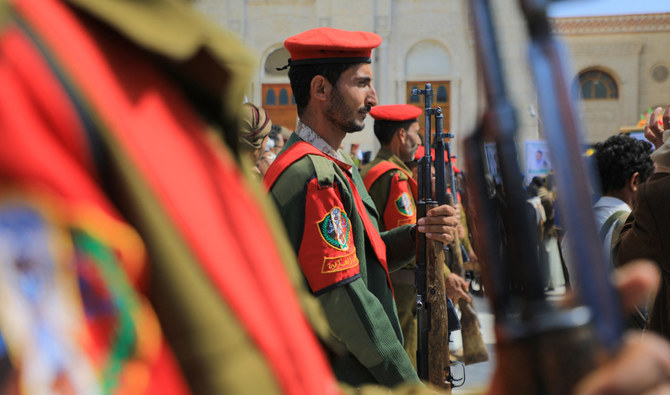DUBAI: A missile attack by Yemen’s Houthis that damaged a Belize-flagged ship traveling through the Bab el-Mandeb Strait that connects the Red Sea and the Gulf of Aden has forced the crew to abandon the vessel, authorities said Monday. Another ship reportedly came twice under attack in the Gulf of Aden.
The Iran-backed Houthis also claimed they shot down an American MQ-9 Reaper drone, something not immediately acknowledged by US forces in the region. However, the Houthis have downed US drones before.
Meanwhile, the US military said it was conducting new airstrikes targeting the Houthis, including one that targeted the first Houthi underwater drone seen since they began launching attacks on international shipping in November.
The ship targeted in the Houthi attack on Sunday reported sustaining damage after “an explosion in close proximity to the vessel,” the British military’s United Kingdom Maritime Trade Operations center reported.
“Military authorities report crew have abandoned the vessel,” the UKMTO said. “Vessel at anchor and all crew are safe.”
Houthi Brig. Gen. Yahya Saree issued a statement claiming the attack, saying the vessel later sunk.
There was no independent confirmation the vessel sank.
“The ship suffered catastrophic damages and came to a complete halt,” Saree said. “During the operation, we made sure that the ship’s crew exited safely.”
The private security firm Ambrey reported the British-registered, Lebanese-operated cargo ship had been on its way to Bulgaria after leaving Khorfakkan in the United Arab Emirates.
Ship-tracking data from MarineTraffic.com analyzed by The Associated Press identified the vessel targeted as the Rubymar. Its Beirut-based manager could not be reached for comment.
The Houthis later also identified the ship as the Rubymar, as did the US military’s Central Command.
Central Command said the attack involved two anti-ship ballistic missiles, which saw one struck the Rubymar.
Ambrey described the ship as being partially laden with cargo, but it wasn’t immediately clear what it had been carrying. The ship had turned off its Automatic Identification System tracker while in the Arabian Gulf early this month.
Later Monday, the UKMTO and Ambrey said a second vessel came under attack in the Gulf of Aden. Ambrey described the vessel as a Greek-flagged, US-owned bulk carrier bound for Aden, Yemen, and carrying grain from Argentina. The same ship then came under attack again, later in the day.
Those details, combined with ship-tracking data, identified the vessel as the Sea Champion. Its managers could not be immediately reached. The Houthis later claimed the attack, but instead said it targeted a second vessel other than the Sea Champion in that assault.
Late Monday, the UKMTO and Ambrey reported a suspected Houthi drone attack targeting a ship off Djibouti in the Bab el-Mandeb Strait. UKMTO described the vessel as sustaining “superficial damage.”
Since November, the rebels have repeatedly targeted ships in the Red Sea and surrounding waters over Israel’s war targeting Hamas in the Gaza Strip. They have frequently targeted vessels with tenuous or no clear links to Israel, imperiling shipping in a key route for trade among Asia, the Mideast and Europe. Those vessels have included at least one with cargo for Iran, its main benefactor.
In a separate attack, Saree also claimed that Houthi forces shot down an MQ-9 drone near Yemen’s port city of Hodeida on the Red Sea. He offered no evidence for the claim.
The Houthi “air defenses were able to shoot down an American plane — MQ-9 — with a suitable missile while it was carrying out hostile missions against our country on behalf of the Zionist entity,” Saree said.
The US military did not immediately confirm the loss of any drones in the region. However, the Houthis have surface-to-air missile systems capable of shooting down high-flying American drones. In November, the Pentagon acknowledged the loss of an MQ-9, shot down by the rebels over the Red Sea.
Since Yemen’s Houthi rebels seized the country’s north and its capital of Sanaa in 2014, the US military has lost four drones to shootdowns by the rebels — in 2017, 2019 and this year.
Meanwhile, the US military’s Central Command reported it carried out five airstrikes targeting Houthi military equipment. Those strikes targeted mobile anti-ship cruise missiles, an explosive-carrying drone boat and an “unmanned underwater vessel,” Central Command said.
“This is the first observed Houthi employment of a UUV since attacks began in Oct. 23,” Central Command said.





























